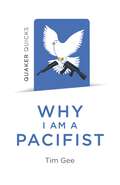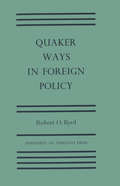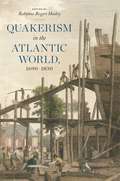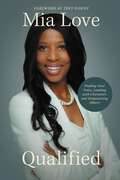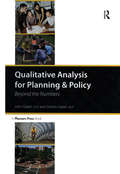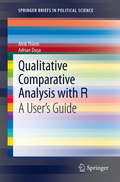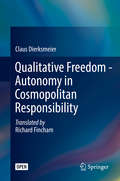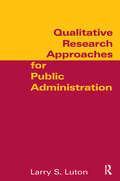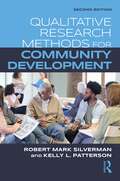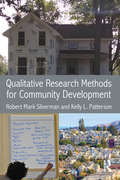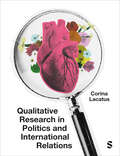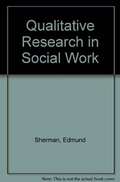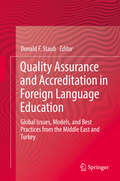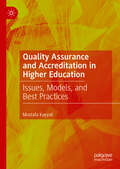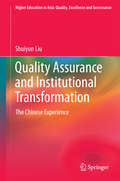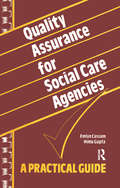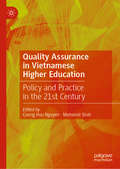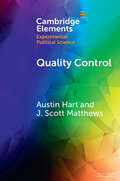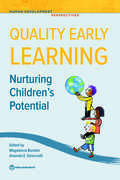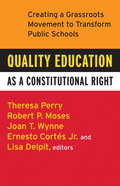- Table View
- List View
Quaker Quicks - Why I am a Pacifist: A Call For A More Nonviolent World
by Tim GeeTim Gee tells the story of why he became a pacifist and what it means to him. Gee reflects on the lives of peacemakers past and present to provide responses to questions like &“Don&’t we have to hit back if we're hurt?&”, &“Don&’t we need war to respond to evil?&” and &“Doesn&’t religion justify wars?&”. This is a critique of war, but more than that, it stakes a claim for pacifism's feminist and anti-racist qualities. This is a call for a more nonviolent world.
Quaker Ways in Foreign Policy
by Robert O. ByrdFor three hundred years the Society of Friends, or Quakers, has been forwarding to governments recommendations on foreign policy, and it has often been in the vanguard of thought in its social and political views. In this study, Dr. Byrd brings together and states carefully and accurately those beliefs, principles, attitudes, and practices which have been fundamental to the Quaker approach. He illustrates and verifies his statement by an analytical Friends acting in official and semi-official capacities, which relate to foreign policy and international relations.Dr. Byrd's systematic exposition of the modern Quaker's theory of international relations offers a stimulating antidote to the realpolitik school of thought. His account of the Quaker interest in international affairs from 1647 to the present underlines for the diplomatic historian the role of morality in diplomacy, the influence of public opinion upon policy, and the part played by groups like Friends in shaping public attitudes. As Hans J. Morgenthau comments in his Foreword, "In a world which uses Christian ethics for un-Christian ends it is indeed moving to follow the historical trail of a Christian sect which seeks to transform itself and political society in the image of Christian teaching. . . . In their convictions, achievements, and sufferings the Quakers bear witness to the teachings of Christianity; in their failures they bear witness to the insuperable stubbornness of the human condition. . . . not the least of the merits of Professor Byrd's book is his ability to convey through the movement of his mind and pen something of that moving quality which makes the Quaker approach to foreign policy, if nothing else, a noble experiment in Christian living."
Quakerism in the Atlantic World, 1690–1830 (The New History of Quakerism #3)
by Robynne Rogers HealeyThis third installment in the New History of Quakerism series is a comprehensive assessment of transatlantic Quakerism across the long eighteenth century, a period during which Quakers became increasingly sectarian even as they expanded their engagement with politics, trade, industry, and science. The contributors to this volume interrogate and deconstruct this paradox, complicating traditional interpretations of what has been termed "Quietist Quakerism."Examining the period following the Toleration Act in England of 1689 through the Hicksite-Orthodox Separation in North America, this work situates Quakers in the eighteenth-century British Atlantic world. Three thematic sections—exploring unique Quaker testimonies and practices; tensions between Quakerism in community and Quakerism in the world; and expressions of Quakerism around the Atlantic world—broaden geographic understandings of the Quaker Atlantic experience to determine how local events shaped expressions of Quakerism. The authors challenge oversimplified interpretations of Quaker practices and reveal a complex Quaker world, one in which prescription and practice were more often negotiated than dictated, even after the mid-eighteenth-century "reformation" and tightening of the Discipline on both sides of the Atlantic. Accessible and well-researched, Quakerism in the Atlantic World, 1690-1830, provides fresh insights and raises new questions about an understudied period of Quaker history.In addition to the editor, the contributors to this volume include Richard C. Allen, Erin Bell, Erica Canela, Elizabeth Cazden, Andrew Fincham, Sydney Harker, Rosalind Johnson, Emma Lapsansky-Werner, Jon Mitchell, and Geoffrey Plank.
Quakerism in the Atlantic World, 1690–1830 (The New History of Quakerism)
by Robynne Rogers HealeyThis third installment in the New History of Quakerism series is a comprehensive assessment of transatlantic Quakerism across the long eighteenth century, a period during which Quakers became increasingly sectarian even as they expanded their engagement with politics, trade, industry, and science. The contributors to this volume interrogate and deconstruct this paradox, complicating traditional interpretations of what has been termed “Quietist Quakerism.”Examining the period following the Toleration Act in England of 1689 through the Hicksite-Orthodox Separation in North America, this work situates Quakers in the eighteenth-century British Atlantic world. Three thematic sections—exploring unique Quaker testimonies and practices; tensions between Quakerism in community and Quakerism in the world; and expressions of Quakerism around the Atlantic world—broaden geographic understandings of the Quaker Atlantic experience to determine how local events shaped expressions of Quakerism. The authors challenge oversimplified interpretations of Quaker practices and reveal a complex Quaker world, one in which prescription and practice were more often negotiated than dictated, even after the mid-eighteenth-century “reformation” and tightening of the Discipline on both sides of the Atlantic. Accessible and well-researched, Quakerism in the Atlantic World, 1690-1830, provides fresh insights and raises new questions about an understudied period of Quaker history.In addition to the editor, the contributors to this volume include Richard C. Allen, Erin Bell, Erica Canela, Elizabeth Cazden, Andrew Fincham, Sydney Harker, Rosalind Johnson, Emma Lapsansky-Werner, Jon Mitchell, and Geoffrey Plank.
Qualified: Finding Your Voice, Leading with Character, and Empowering Others
by Mia LoveThis memoir from the first Black Republican congresswoman in America shows readers how to own their stories, find their voices, and lead with character as they empower others to do the same. For so long, women—and Black women in particular—have been taught that they must have a stellar background, the highest degree of education, and the strongest resumé imaginable to earn their place in a society historically dominated by white men. As a result, women have found themselves plagued with anxiety and self-doubt and have felt constricted by this limiting belief of qualification by achievement and the necessity of sporting a flawless track record. These false assumptions have discouraged women from pursuing positions of power and influence for the betterment of their communities, leading to underrepresentation in our institutions and the tragedy of wasted potential. But it doesn&’t have to be this way. Mia Love has devoted her entire life to defeating illusive boundaries and redefining the meaning of &“qualified.&” The daughter of immigrant parents who sacrificed everything to embrace the American Dream, Love learned that she had something unique and valuable that she could give back to her country—her voice. And now she wants to empower others to do the same. For years, Love faced intense scrutiny and fielded questions regarding her political party affiliation, her desire to run for office, and her commitment to championing conservative values. In Qualified, Love explains her answers to these questions by taking readers through her journey from election to her local city council, leading as mayor of Saratoga Springs, and making history in the U.S. House of Representatives serving Utah&’s 4th Congressional District from 2015–2019. Her story showcases how we can stay true to our integrity, fearlessly voice our values despite fervent opposition, and begin again after every failure and setback.
Qualifying & Attacking Expert Witnesses
by Robert CliffordPerhaps no litigation task is more important than diluting the effect of the opposition's expert. This formidable challenge begins well before discovery and continues through settlement or trial. Let Robert Clifford's Qualifying & Attacking Expert Witnesses show you how to dig deep for unreliable testimony, no matter how sterling the expert's credentials. The book details dozens of high-potential attacks, including: * Failure to consider other causes * Subjective testing * Insufficient sample * Anecdotal evidence * Temporal relationship * Erroneous extrapolation * Research prepared for litigation With this helpful guide you will be able to disqualify, cross-examine, and impeach your opponent's expert, while effectively presenting your expert. You will also receive pattern questions, checklists, tactics, and case law for working with experts, and specific advice for medical, psychological, economic, physical facts, engineering, construction, insurance, employment, linguistic, document examination, legal malpractice, and criminal experts.
Qualitative Analysis for Planning & Policy: Beyond the Numbers
by John Gaber Sharon GaberThis book explains how to use and adapt these techniques and how to integrate these methods with more traditional qualitative research. Chapters offer step-by-step guidance to setting up various kinds of qualitative research projects, collecting data, organizing data, and analyzing data. Case studies show how a mix of qualitative and quantitative research can help planners build consensus and tackle large, complicated projects.
Qualitative Comparative Analysis with R
by Adrian Dusa Alrik ThiemSocial science theory often builds on sets and their relations. Correlation-based methods of scientific enquiry, however, use linear algebra and are unsuited to analyzing set relations. The development of Qualitative Comparative Analysis (QCA) by Charles Ragin has given social scientists a formal tool for identifying set-theoretic connections based on Boolean algebra. As a result, interest in this method has markedly risen among social scientists in recent years. This book offers the first complete introduction on how to perform QCA in the R software environment for statistical computing and graphics with the QCA package. Developed as a comprehensive solution, QCA provides an unprecedented scope of functionality for analyzing crisp, multi-value and fuzzy sets. The reader is not required to have knowledge of R, but the book assumes an understanding of the fundamentals of QCA. Using examples from published work, the authors demonstrate how to make the most of QCA's wide-ranging capabilities for the reader's own purposes. Although mainly written for political scientists, this book is also of interest to scholars from other disciplines in the social sciences such as sociology, business, management, organization, anthropology, education and health.
Qualitative Experteninterviews: Konzeptionelle Grundlagen und praktische Durchführung (Elemente der Politik)
by Robert KaiserDas Lehrbuch richtet sich primär an Studierende und jüngere Wissenschaftlerinnen und Wissenschaftler und bietet in knapper, aber systematischer Form eine praxisorientierte Handreichung für die Planung und Durchführung qualitativer Experteninterviews in der Politikwissenschaft. Es vermittelt einen methodisch fundierten und anwendungs- bzw. problemorientierten Zugang zu dieser Form der eigenständigen qualitativen Datenerhebung. Für die 2. Auflage wurde das Buch grundlegend aktualisiert und um ein Unterkapitel zur software-basieren Unterstützung der Durchführung von Experteninterviews ergänzt. Zusätzliche Fragen per App: Laden Sie die SN Flashcards App kostenlos herunter und nutzen Sie exklusives Zusatzmaterial, um Ihr Wissen zu prüfen.
Qualitative Freedom - Autonomy in Cosmopolitan Responsibility
by Claus DierksmeierIn the light of growing political and religious fundamentalism, this open access book defends the idea of freedom as paramount for the attempt to find common ethical ground in the age of globality. The book sets out to examine as yet unexhausted ways to boost the resilience of the principle of liberalism. Critically reviewing the last 200 years of the philosophy of freedom, it revises the principle of liberty in order to revive it. It discusses many different aspects that fall under its three main topics: the metaphysics of freedom, quantitative freedom and qualitative freedom. Open societies worldwide have come under increasing pressure in the last decades. The belief that politics and markets fare best when guided by the principle of liberty presently faces multiple challenges such as terrorism, climate warming, inequality, populism, and financial crises. In the view of its critics, the idea of freedom no longer offers adequate guidance to meet these challenges and should be partially corrected or even entirely replaced by countervailing values. Against the reduction of freedom to the merely quantitative question as to how much liberties individuals call their own, this book draws attention to the qualitative concerns which and whose opportunities society should foster. It argues that, correctly understood, the idea of liberty commits us to defend as well as advance the freedom of each and every world citizen.
Qualitative Research Approaches for Public Administration
by Larry S. LutonThoroughly updated, more concise than the previous edition, and available for the first time in paperback,
Qualitative Research Methods for Community Development
by Robert Mark Silverman Kelly L. PattersonThe second edition of Qualitative Research Methods for Community Development teaches the basic skills, tools, and methods of qualitative research with special attention to the needs of community practitioners. This book teaches students entering planning, community development, nonprofit management, social work, and similar applied fields the core skills necessary to conduct systematic research designed to empower communities and promote social change. Focusing on the basic elements of qualitative research, such as field observation, interviewing, focus groups, and content analysis, this second edition of this book provides an overview of core methods and theoretical underpinnings of successful research. It also includes two new chapters on qualitative data analysis software and techniques for conducting online qualitative interviews and focus groups. From housing, community organizing, neighborhood planning, and urban revitalization, this book gives students the skills they need to undertake their own projects and provides professionals a valuable reference for their future research. This book serves as a primary text for courses in applied qualitative research and as a reference book for professionals and community-based researchers.
Qualitative Research Methods for Community Development
by Robert Mark Silverman Kelly L. PattersonQualitative Research Methods for Community Development teaches the basic skills, tools, and methods of qualitative research with special attention to the needs of community practitioners. This book teaches students entering planning, community development, nonprofit management, social work, and similar applied fields the core skills necessary to conduct systematic research designed to empower communities and promote social change. Focusing on the basic elements of qualitative research, like field observation, interviewing, focus groups, and content analysis, Qualitative Research Methods for Community Development provides an overview of core methods and theoretical underpinnings of successful research. The book provides examples from past research used in transformative community projects across multiple disciplines. From housing, community organizing, neighborhood planning, and urban revitalization, this book gives students the skills they need to undertake their own projects, and provides professionals a valuable reference for their future research. The book serves as a primary text for courses in applied qualitative research, and as a reference book for professionals and community-based researchers. In addition to content detailing core methods used in qualitative research, it includes a chapter which provides guidance for the dissemination of qualitative results to a spectrum of audiences applying qualitative methods to action research and community empowerment.
Qualitative Research Methods for Community Development
by Robert Mark Silverman Kelly PattersonThe second edition of Qualitative Research Methods for Community Development teaches the basic skills, tools, and methods of qualitative research with special attention to the needs of community practitioners. This book teaches students entering planning, community development, nonprofit management, social work, and similar applied fields the core skills necessary to conduct systematic research designed to empower communities and promote social change.Focusing on the basic elements of qualitative research, such as field observation, interviewing, focus groups, and content analysis, this second edition of this book provides an overview of core methods and theoretical underpinnings of successful research. It also includes two new chapters on qualitative data analysis software and techniques for conducting online qualitative interviews and focus groups.From housing, community organizing, neighborhood planning, and urban revitalization, this book gives students the skills they need to undertake their own projects and provides professionals a valuable reference for their future research. This book serves as a primary text for courses in applied qualitative research and as a reference book for professionals and community-based researchers.
Qualitative Research in Politics and International Relations: A practical and pluralist guide
by Corina LacatusThis groundbreaking textbook is the essential introduction to qualitative research for politics and international relations. Presented in a refreshingly accessible manner, this text applies a practical approach to help you learn by doing and will equip you with the tools to get researching. Embrace a pedagogical approach that seamlessly integrates theoretical insights with hands-on guidance, empowering you to navigate the complexities of qualitative research with confidence and clarity. Key Benefits Include: · Practical Approach: bid farewell to abstract learning with practical tools and exercises that instil intuition and proficiency. Step-by-step support for students grappling with the logistical intricacies of research design, data collection, and analysis. · Close Links to the Disciplines: immerse yourself in the latest seminal research and learn how to select robust qualitative designs for your research questions. · Demystify Theory and Methodology: this text addresses the perennial challenge of aligning theory with methodology, providing a cohesive framework for qualitative research. · Expert Guidance: for educators seeking to incorporate this invaluable resource into their curriculum, a complementary online teaching guidebook offers guidance and suggestions on how to truly engage with the material and enrich the learning experience for your students. An essential companion for undergraduate students navigating qualitative methods modules to postgraduate students and researchers shaping their research projects. Corina Lacatus is a Senior Lecturer in Global Governance at the School of Politics and International Relations, Queen Mary University of London.
Qualitative Research in Politics and International Relations: A practical and pluralist guide
by Corina LacatusThis groundbreaking textbook is the essential introduction to qualitative research for politics and international relations. Presented in a refreshingly accessible manner, this text applies a practical approach to help you learn by doing and will equip you with the tools to get researching. Embrace a pedagogical approach that seamlessly integrates theoretical insights with hands-on guidance, empowering you to navigate the complexities of qualitative research with confidence and clarity. Key Benefits Include: · Practical Approach: bid farewell to abstract learning with practical tools and exercises that instil intuition and proficiency. Step-by-step support for students grappling with the logistical intricacies of research design, data collection, and analysis. · Close Links to the Disciplines: immerse yourself in the latest seminal research and learn how to select robust qualitative designs for your research questions. · Demystify Theory and Methodology: this text addresses the perennial challenge of aligning theory with methodology, providing a cohesive framework for qualitative research. · Expert Guidance: for educators seeking to incorporate this invaluable resource into their curriculum, a complementary online teaching guidebook offers guidance and suggestions on how to truly engage with the material and enrich the learning experience for your students. An essential companion for undergraduate students navigating qualitative methods modules to postgraduate students and researchers shaping their research projects. Corina Lacatus is a Senior Lecturer in Global Governance at the School of Politics and International Relations, Queen Mary University of London.
Qualitative Research in Social Work
by William J. Reid Edmund ShermanIn this volume, progressive experts survey recent trends in qualitative study, which relies on small sample groups and interview data to better represent the context and complexity of social work practice. Chapters address different approaches to qualitative inquiry, applications to essential areas of research and practice, integration of qualitative and quantitative methods, and epistemological issues. <p><p> This second edition brings even greater depth and relevance to social work qualitative research, including new material that tackles traditional research concerns, such as data quality, ethics, and epistemological stances, and updated techniques in data collection and analysis. To increase the usefulness for students and researchers, the editors have reorganized the text to present basic principles first and then their applications, and they have increased their focus on ethics, values, and theory. New and revised illustrative studies highlight more than ever the connection between effective research and improved social functioning among individuals and groups. The collection continues to feature scholars and practitioners who have shaped the social work research practice canon for more than twenty years, while also adding the innovative work of up-and-coming talent.
Quality Assurance and Accreditation in Foreign Language Education: Global Issues, Models, and Best Practices from the Middle East and Turkey
by Donald F. StaubGreater student mobility, increasing demand for access to tertiary education, as well as policy changes have spurred rapid expansion of the global higher education sector. However, with increased demand comes considerable variation in the quality of the supply. As higher education is an expensive endeavor for all stakeholders – governments, funders, employers, and families – there are also increasing expectations for accountability and demonstrations of quality. English as a foreign language (EFL) programs, in particular, are under considerable pressure to substantiate their value, resulting in a significant rise in interest around their quality. This volume is the outcome of a May 2018 international conference on quality and specialized accreditation, held in Turkey. The book’s three sections take the reader from the global to the program level, examining trends and best practices in quality assurance and accreditation in EFL programs. The book’s geographic focus is primarily the Middle East and Turkey, yet the issues discussed herein a quite global in nature. This volume will be of interest to educational administrators at the institutional or program level, educational leadership programs focusing on higher education, language teacher preparation programs, and administrators in centralized education systems or accrediting organizations.
Quality Assurance and Accreditation in Higher Education: Issues, Models, and Best Practices
by Mustafa KayyaliThis book examines a wide range of topics within quality assurance at universities in order to present a conceptual, historical, and thematic mapping of academic and practical perspectives. As we navigate the complex tapestry of the twenty-first century, where change is constant, the global higher education landscape is undergoing profound shifts that define its present and signal its future. In this book, the author probes the mechanisms of quality assurance to not only ensure excellence but also resonate as responses to the contemporary landscape shaped by the challenges of globalization, technological advancement, and societal transformation.
Quality Assurance and Institutional Transformation
by Shuiyun LiuThis book illustrates the higher education quality assurance system and its impact on institutional transformation in China. It starts by describing the higher education system in China and its quality assessment schemes. It discusses in detail the Quality Assessment of Undergraduate Education (QAUE) and the Subject Evaluation, two of the most influential external quality assessment schemes, which are conducted on the institutional and subject levels respectively. In the second part of this book, QAUE is taken as an example for the impact analysis. Using case studies, it explores the impact of the QAUE on various dimensions of quality provisions in universities with different statuses and presents the views of various stakeholders. Based on the empirical findings from the Chinese schemes and the theories on organizational change and the mechanism of external quality assessment, it proposes a model to describe how quality assessment interacts with the evaluated universities and causes them to change.
Quality Assurance for Social Care Agencies: A Practical Guide
by Emlyn Cassam Himu GuptaQuality Assurance for Social Care Agencies is specifically designed to enable you to set up a Quality Assurance system within a social services setting. Including practical checklists, it covers all aspects of Quality Assurance - from what is meant by Quality Assurance and how to implement it to how to monitor and maintain quality control. Examples and details of experiences are included to help you get it right first time.
Quality Assurance in Vietnamese Higher Education: Policy and Practice in the 21st Century
by Mahsood Shah Cuong Huu NguyenThis book provides a comprehensive overview of quality assurance in Vietnamese higher education under the centralised management of the government after 15 years of development. By implementing quality assurance and accreditation mechanisms, the Vietnamese government expected to be able to control and improve the quality of the higher education system. The editors and contributors therefore examine and analyse policies and practices related to the establishment and development of Vietnam's quality assurance system. Amongst other things, the chapters investigate drivers of quality assurance, stakeholders engaged in quality assurance and the future of quality assurance in Vietnamese higher education in benchmarking with other quality assurance systems in the region and across the world. This book will be of interest and value to students and scholars of Vietnamese higher education, as well as quality assurance in higher education more generally, but particularly in developing nations.
Quality Control: Experiments on the Microfoundations of Retrospective Voting (Elements in Experimental Political Science)
by Austin Ray Hart J Scott MatthewsConventional models of voting behavior depict individuals who judge governments for how the world unfolds during their time in office. This phenomenon of retrospective voting requires that individuals integrate and appraise streams of performance information over time. Yet past experimental studies short-circuit this 'integration-appraisal' process. In this Element, we develop a new framework for studying retrospective voting and present eleven experiments building on that framework. Notably, when we allow integration and appraisal to unfold freely, we find little support for models of 'blind retrospection.' Although we observe clear recency bias, we find respondents who are quick to appraise and who make reasonable use of information cues. Critically, they regularly employ benchmarking strategies to manage complex, variable, and even confounded streams of performance information. The results highlight the importance of centering the integration-appraisal challenge in both theoretical models and experimental designs and begin to uncover the cognitive foundations of retrospective voting.
Quality Early Learning: Nurturing Children's Potential (Human Development Perspectives)
by Magdalena Bendini Amanda E. DevercelliIn this volume, leading researchers and implementation experts from an array of disciplines provide evidence-based, cost-effective, and actionable strategies for delivering quality early childhood education (ECE) at scale in low- and middle-income countries (LMICS).Over the past decade, neuroscientists, developmental and cognitive psychologists, economists, and education researchers have amassed evidence to inform ECE program design. Yet much of this evidence has not been readily accessible to policymakers and practitioners, and potential synergies from cross-disciplinary considerations have not been realized.Quality Early Learning: Nurturing Children’s Potential synthesizes the evidence across disciplines and charts a forward course for quality ECE. The volume includes Overview, From Evidence to Effective Policies: How to Invest in Early Childhood Education to Nurture Children’s Potential, by Magdalena Bendini, Amanda E. Devercelli, Elaine Ding, Melissa Kelly, and Adelle Pushparatnam Chapter 1, Learning in the Early Years, by Elizabeth Spelke and Kristin Shutts Chapter 2, Pedagogy and Curricula Content: Building Foundational Skills and Knowledge, by David Whitebread and Yasmin Sitabkhan Chapter 3, Building an Effective Early Childhood Education Workforce, by Nirmala Rao, Emma Pearson, Benjamin Piper, and Carrie Lau Chapter 4, Creating Early Childhood Education Environments That Promote Early Learning, by Cynthia Adlerstein and Alejandra Cortázar Chapter 5, The Role of Management, Leadership, and Monitoring in Producing Quality Learning Outcomes in Early Childhood Education, by Iram Siraj, Violeta Arancibia, and Juan Barón Chapter 6, Toward Quality Early Learning: Systems for Success, by Sharon Lynn Kagan and Caitlin M. Dermody In the volume, the authors provide the latest evidence on how young children learn most effectively and how ECE programs can foster children’s natural ability and motivation to learn. It offers guidance for policy makers on policy design and implementation including what elements of ECE to prioritize in resource- and capacity-constrained settings in LMICs.
Quality Education as a Constitutional Right
by Lisa Delpit Theresa Perry Joan T. Wynne Robert P. Moses Ernesto CortesIn 2005, famed civil rights leader and education activist Robert Moses invited one hundred prominent African American and Latino intellectuals and activists to meet to discuss a proposal for a campaign to guarantee a quality education for all children as a constitutional right--a movement that would "transform current approaches to educational inequity, all of which have failed miserably to yield results for our children." The response was passionate, and the meeting launched a movement. This book--emerging directly from that effort--reports on what has happened since and calls for a new scale of organizing, legal initiatives, and public definitions of what a quality education is. Essays include · Robert Moses's historically rooted call for citizens, especially young people, to make the demand for quality education · Ernesto Cortés's view from decades of work organizing Latino communities in Texas · Charles Payne's interview with students from the Baltimore Algebra Project, who organized to make historic demands on their district · Legal scholar Imani Perry's nuanced analysis of the prospects of making a case for quality education as a right guaranteed by the Constitution · Perspectives from scholars Lisa Delpit and Joan T. Wynne, and by teachers Alicia Caroll and Kim Parker, who provide examples of what quality education is, describing its goal, and how to guide practice in the meantime
